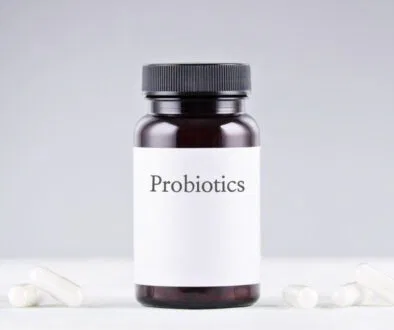The Ultimate Guide to Gluten-Free Probiotics: Improve Your Digestive Health and Wellness

Published August 25, 2023
One of the most transformative substances we can consume is probiotics. Its benefits go from digestive health to overall wellness. It’s an excellent supplement for anyone’s diet.
Gluten-free probiotics are vital for people with gluten sensitivities. They are also critical for celiac patients. They can help manage the inflammation caused by an autoimmune response to gluten. If you’re experiencing an adverse reaction to wheat, barley, or rye, adding a probiotic supplement is the best. It is a great way to ensure your body gets the necessary nutrition while avoiding gluten.
And if you’re one to be clueless in the discourse of Gluten-free probiotics, this article is for you. Below is the ultimate guide to gluten-free probiotics. We will discuss everything there is to know about it. Along with the best gluten-free probiotic supplements you can find on the market. Let’s head to the discussion.
What Are Probiotics?
Let’s break it down. Probiotic words can be dissected into their Latin and Greek roots. The prefix “pro-” is from Latin. It means “in advance of” or “taking care of.” The root word “bio” comes from the Greek word bios, meaning Life. The suffix “-tic” is also from Greek. It holds the meaning “pertaining to.” Probiotics translates to taking care of Life when formed into a complete definition.
Probiotics are a synthesis of live beneficial bacteria and yeasts that naturally reside in our bodies. It is made up of good bacteria that aid in keeping our body healthy and in its optimal state. These good bacteria help in many ways. It fights off harmful bacteria when you have too much of it. As a result, you feel better.
The main job of probiotics is to sustain a healthy balance in your body. When you are sick, harmful bacteria go into your body. It heightens in numbers. It knocks our body out of balance. Good bacteria operate to fight off harmful bacteria. It restores the balance within the body. It also supports immune function and controls inflammation.
Moreover, certain types of good bacteria can also help your body digest food. It creates vitamins. It aids in supporting the cells that line your gut. It also supports the breakdown and absorption of medications.
What Is Gluten?
Gluten is a word we’ve all been hearing more and more lately. It is due to more people becoming aware that they react differently to it. Also, they experience specific symptoms after ingesting gluten. These reactions can include digestive issues, inflammation, and damage to the small intestine.
Gluten is a protein that often exists naturally in plants. Wheat, rye, and barley have it. If you have gluten sensitivity, avoiding food that includes these ingredients is encouraged. You’re expected to consume so long they are labeled “gluten-free.”
People who are gluten intolerant may switch to a gluten-free diet. This diet includes beans, fresh meats, eggs, fish, poultry, and fruits and vegetables. Furthermore, there are some grains and starches that are allowed to be incorporated into this particular diet. Buckwheat, amaranth, arrowroots, quinoa, rice, and tapioca, among others, can be part of your diet, even if you are avoiding gluten.
Are Probiotics Gluten-Free?
Let’s start with the good news. You can take probiotics if you are gluten intolerant or have celiac disease. It is because probiotics are already gluten-free.
Live microorganisms do not contain gluten. Also, fillers in probiotics should be gluten-free. No needed filler would contain gluten. Yet, research shows that about 50% of probiotics contain traces of gluten from manufacturing. In fact, two of the brands with “gluten-free probiotics” labels have higher traces. It is when compared to those not labeled gluten-free. It is why some people claim we need gluten-free probiotics. Fortunately, the trace amounts are so low. You would need to consume large doses of probiotics to cause any damage.
In another study, on 22 commonly bought probiotics, probiotics with trace amounts of gluten contain less than 20 parts per million. The Food and Drug Administration considers an item gluten-free if it has less than 20 parts per million. It entails these were gluten-free.
Not only are probiotics safe to take. If you have celiac disease or non-celiac gluten sensitivity. Consuming it can help decrease symptoms and better the immune help of your gut.
How to Make Sure Your Probiotics Are Gluten-Free?
1. Read the labels
Scan for a “gluten-free” label printed on the product. Based on the Food and Drug Administration, “gluten-free” is a voluntary claim manufacturers can use on their labels. FDA regulations require a gluten limit of fewer than 20 parts per million to use this claim.
2. Know your ingredients
Gluten can also be recorded as a secondary ingredient used for fillers and binders. It suggests that the product is not a gluten-free probiotic supplement. You must carefully read the labels. For instance, you should avoid anything that lists the word starch. Some starches include protein gluten. Also, pay attention to terms such as pregelatinized starch, sodium starch glycolate, and dextrin or dextrose.
3. Possible Contamination
Gluten can manifest in probiotics through cross-contamination. It is especially if the same equipment is employed to make other supplements. If cross-contamination is a possibility, some labels include a “may contain” statement.
Why Gluten-Free Probiotics Might Help Your Digestive Health and Overall Wellness?
-
Celiac Disease
Individuals with celiac disease have an immune reaction to gluten. It damages the lining of the small intestine. Consuming gluten on their part can lead to digestive issues and nutrient deficiencies. Choosing gluten-free probiotics ensures that those with celiac disease can support their gut health properly. It is without risking gluten exposure.
-
Gluten Intolerance and Sensitivity
Some individuals have symptoms similar to celiac disease when consuming gluten. It is even without having the condition. Switching to gluten-free probiotics can help safeguard against potential digestive discomfort and inflammation.
-
Gut Microbiota Balance
Probiotics are wholesome bacteria that maintain a healthy balance of microorganisms in the gut. Imbalances in the gut microbiota lead to digestive issues. They can trigger bloating, gas, and irregular bowel movements. Adding gluten-free probiotics to your diet supports the diversity and loads of beneficial bacteria in your digestive system.
-
Inflammation reduction
Gluten has been linked to increased intestinal inflammation. By opting for gluten-free probiotics, individuals can lessen inflammation in the gut. Further, they can promote a healthier digestive environment.
Aside from these four main benefits of gluten-free probiotics in our digestive health, here are things they can do that boost wellness:
- Boosts the immune levels
- Boost energy levels
- Support skin health
- Support nutrient absorption
- Better vaginal health
- Boost mood and mental health
5 Best Gluten-Free Probiotic Supplements
-
Bionaze Probiotic Supplement
Bionaze is a proprietary blend of BLIS K12 and Bl-04 probiotic strains in a gluten-free and vegetarian formula. It helps improve digestion and supports your immune system. It is also well regarded for its benefits to ear, nose, and throat health. Each tablet is packed with 28 mg of active probiotic cultures.
Bionaze improves one’s holistic well-being. It aids in sustaining a healthy balance of bacteria in your upper respiratory area. It is one of the top gluten-free probiotic supplements you should look for. It’s highly impressive, commendable, and pays attention to health and well-being science. -
BioSchwartz Extra Strength Probiotics
Schwartz Bioresearch combines all-natural ingredients with a protective casing that can withstand harsh stomach acids, ensuring the probiotics make it to the intestinal tract. They market their probiotics as ten times more potent than any of their competitor’s products. It blends Bifidobacteria and Lactobacilli strains with up to 40 billion colony-forming units (CFUs). Their vegetarian and gluten-free products guarantee no lactose, soy, wheat, nuts, iron, sugar, chemicals, or artificial colors.
-
Physician’s Choice Probiotic 60 Billion CFU
Physician’s Choice Probiotic 60 Billion CFU is yet another fantastic gluten-free probiotic supplement. It comes packed with ten different strains of probiotics to diversify your gut microbiome. Physicians’ choice probiotics pride themselves on their DRcaps or “delayed-release capsules,” which ensure that the probiotics reach their desired destination.
-
Garden of Life Probiotics
Garden of Life is one of the most well-respected and well-recognized supplement companies out there. It may be due to its focus on quality and its wide range of certifications. Garden of Life’s products are gluten-free and certified by NSF International and the Gluten-Free Certification Organization (GFCO). Rest assured; their products have gone through the necessary tests and certifications. They have three main probiotic lines: Dr. Formulated, RAW Probiotics, and Primal Defense. Each of them comes with unique features formulated to match every individual’s specific needs.
-
Nature’s Bounty Probiotics
Nature’s Bounty is one of the brands under Nature’s Bounty Co., which features some household names in health supplements. Nature’s Bounty they carry a wide variety of probiotic supplements to suit your dietary needs. They also offer the incredibly delicious Nature’s Bounty Probiotic Gummies, flavored with natural fruit flavors. Their different probiotic products include Acidophilus, Acidophilus Probiotic, Controlled Delivery Probiotic, Probiotic 10, Probiotic CD, and Probiotic GX.

Frequently Asked Questions About Gluten-Free Probiotics
-
Should I take probiotics for gluten intolerance?
You will benefit from taking probiotics for your gluten intolerance. Probiotics can assist in reducing gluten allergy symptoms. Probiotics have been proven to improve the effectiveness of a gluten-free diet significantly.
-
Can I trust the gluten-free label on probiotics?
It appears that there have been reports indicating some probiotics labeled as gluten-free may contain traces of gluten. It’s critical to be cautious and do thorough research when selecting probiotic supplements. To make it easier, trust our list of gluten-free probiotic supplements above.
-
Does gluten destroy gut bacteria?
Gluten can cause demonstrable long-term changes in your gut bacteria. It includes decreasing the number of certain kinds of essential gut bacteria. It can also affect part of the immune system called the gut-associated lymphoid tissue. 80% of it resides in our gut.
-
Does gluten destroy the gut lining?
In celiac disease, gluten triggers a reaction that ruins the lining of the small intestines. It lessens the area for absorbing virtually all nutrients. A gluten intolerance can indeed cause problems with our digestive system.
Choosing a Great Gluten-Free Probiotic Supplement
Make your life easier with Bionaze, a highly healthy gluten-free probiotic supplement. It supports not just digestive health but overall body wellness. It represents the latest advancements in probiotic science, so you’ll be in good hands. It is safe to consume and guaranteed to be effective.
It’s critical to look over your health, especially your gut health. Support your digestive system with high-quality gluten-free probiotics. It aids in reaping its good gut health benefits. With our guide, you’re educated to make informed decisions circulating the topic of probiotics. Consider sharing it with others to raise awareness too.
Benefit From The Latest Advancements In Probiotic Science With Bionaze
Bionaze is a proprietary blend of probiotics proven to promote ear, nose, and throat health, improve digestion, and support your immune system. The active ingredients BLIS K12, and BL-04 are considered among the best probiotics according to science.
Get 25% Off Your First Order when you use BIO25 at checkout!

This Content Has Been Reviewed For Factual Accuracy
This content has undergone thorough fact-checking by our team of internal experts. Learn more about the meticulous editorial standard for our website here.
ADVERTISEMENT

About The Author
I am Tracy Gorman, a seasoned writer passionate about creating helpful content. I can delve into any niche and produce valuable articles with my expertise. Beyond writing, I am an avid learner with a passion for digital marketing. During my leisure time, I enjoy immersing myself in literature, experimenting with fashion, staying active, exploring culinary delights, indulging in movies, savoring music, and socializing. And, it’s safe to say, I love cats!




